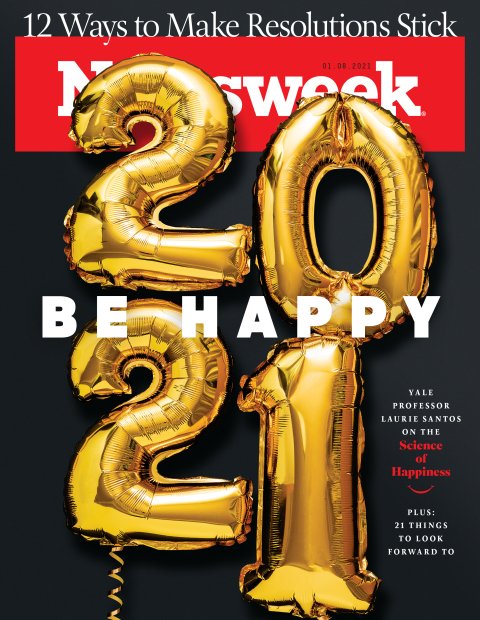Laurie Santos, Yale Happiness Professor, on 5 Things That Will Make You Happier
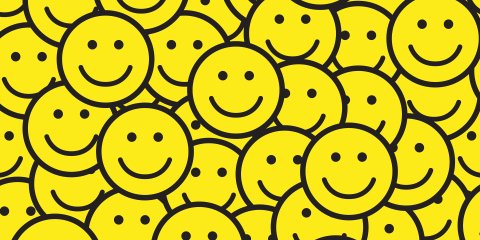
As a professor of psychology at Yale and host of The Happiness Lab podcast, I’ve spent the last few years teaching simple science-backed tips to improve our well-being. I know the research inside out—but the giant dumpster fire of a year that was 2020 has had me struggling, too.
The COVID-19 pandemic has cheated us out of all the good times we live for—the weddings, the vacations, the graduations and celebrations. Our work lives have been upended and our livelihoods threatened. There are people we love who we haven’t seen in months and some we’ll never see again; millions of us are mourning someone close who’s been taken by this awful disease. These overwhelming losses have had a devastating effect on our mental health, with rates of depression, anxiety and even suicidality surging around the world.
The good news is that there’s a lot to be hopeful for in the new year. With a vaccine on the way, there’s a real hope that we’ll soon be returning to the way of life we miss so much. But we can’t toss out our masks just yet. Even under the best public health scenarios, we’re in for several more months of cancelled plans, social distancing, and skyrocketing COVID cases, all during the coldest and darkest times of the year. For a while at least, 2021 is going to feel like 2020 2.0.
So how do we get it through it? Most of us realize that we need to take steps to manage our stress and emotions during tough times. The problem is we tend to go about managing those feelings in surprisingly ineffective ways. If you listen to my podcast, The Happiness Lab, you’ll know this is a common refrain. Our minds have really bad intuition about what we should do to become hap- pier and feel better. So even when we put in some work to improve our well-being, we often wind up doing it wrong.
But there is a better, scientific approach to improving our own happiness. Over the last two decades, psychologists have studied the kinds of behaviors and mindsets that really can boost well-being.
I started gathering these scientific findings together long before anyone had heard of COVID-19. It was back in 2018 when I had just come face-to-face with a different mental health crisis: the one facing my students at Yale. I had just taken on a new role as a Head of College, which meant living with students on campus and seeing their daily lives up close. I witnessed the high rates of stress and anxiety my students were facing first hand. Too many of the young people I cared about were lonely, stressed about the future and intensely worried about their grades. But it wasn’t just Yale students who were struggling. A 2018 survey of college students nationally reported that more than 40 percent were so depressed it was difficult to function, more than 60 percent had experienced overwhelming anxiety, and more than one in 10 had seriously considered suicide in the previous year.
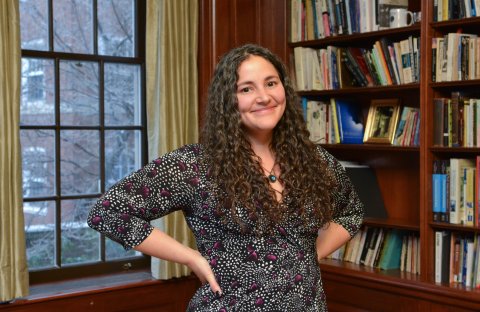
Marsland Michael
Faced with these awful statistics, I wanted to do something to help. I decided to create a new class on the science of happiness—one that gave students practical, evidence-based tips for reducing their stress and improving their well-being. And the students showed up in droves. Over a thousand students attended class the first week. We had to move to a concert hall. In the end, it became the largest class in Yale’s history with just under a quarter of the entire student body registered. The popularity of the class prompted Yale to share the happiness class more broadly. We put a six week version of the course—called The Science of Well-Being—on Coursera.org so that anyone in the world could take it for free. Hundreds of thousands of people signed up.
But that was all before COVID hit. Starting in March of 2020, en- rollment in my online happiness class doubled, tripled—then octupled. In the middle of a pandemic, more than three million people signed up to take an Ivy League class about how to feel happier.
But did it work? Could taking a scientific approach to happiness help people feel better in the midst of a deadly pandemic?
My team and I are still compiling the results formally, which requires months of careful data analysis and review. But I had a chance to see for myself the powerful impact the class was having on my learners’ well-being. The evidence, it turns out, was there in my university mailbox.
“Your mailbox is overflowing.” So began the terse email I received from our psychology department administrative assistant. “And there is more mail on the counter, too. Please stop by some point.” With so many COVID restrictions on campus, I had neglected to pick up my office mail for a few months. I expected to be greeted by the normal stack of flyers and junk mail. Instead I found letter after letter from people writing to thank me. I saw just how powerful the lessons I was teaching could be.
Through happy tears, I read literally hundreds of stories of my students using what I taught them to make it through the anxiety and frustration of the pandemic dark times. But one story in particular struck me, from Susan, an 81-year old retired social studies teacher. Susan had spent most of 2019 nursing her beloved hus- band before he died that Christmas Eve. They’d been in love since seventh grade. “He was the kindest, sweetest and—I think—most handsome man,” she wrote. Susan was devastated by her loss, and thought things couldn’t possibly get worse. And then COVID hit.
“Your psychology of happiness was a godsend.” Susan decided to put the evidence-based tips I taught in class into practice in her daily life. Did these new practices fully eradicate the pain of her loss? Of course not. But when 2020 plunged Susan into the darkest time of her life, the five main takeaways of my class really helped. By incorporating these tips into her life, she said, she wound up significantly happier than she otherwise would have been. And that’s the message I heard over and over again from all those let- ters: scientific research gives us a set of small practices that we can use to make things a little better. And these days, a little bit of happiness counts for a lot.
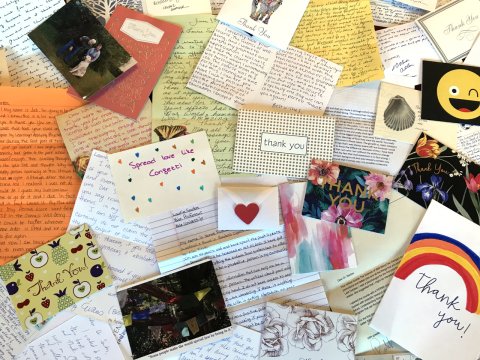
Courtesy of Laurie Santos
So what are these five practices I share with my students? Here are the key ideas that worked for Susan and—as you’ll see from the evidence below—are backed up by science.
Get Social
One of the many cruelties of coViD-19 is that it has robbed us of one of the primary behaviors we can engage in to improve our happiness: being with other people.
When psychologists Ed Diener and Marty Seligman looked at people who scored in the highest 10th percentile on happiness surveys, they discovered that there was one activity that set happy people apart from the rest of us—happy people were more social. The results were so strong that these researchers deemed being around other people as a necessary condition for very high happiness.
We think that solitude feels good, especially when we’re having a tough time, but in truth being with other people will almost always make us feel better. Even if those people are strangers.
Of course, social distancing has made connecting with other people a lot trickier over the past months. But if you want to feel happier, research suggests you should redouble your efforts to connect with the people you care about. Try a socially distanced walk with a neighbor. Or use online tools like Zoom and FaceTime to connect not just with people who live near us, but friends in far-off time zones. If you put in some work and get creative, the possibilities for social connection are endless, even during COVID. I’ve started a monthly virtual spa night with my college roommates, as well as an online morning yoga practice with some professor friends in four different cities. It requires a bit more of a start-up cost than running into a colleague at the water cooler, but if we put in the effort we can reap the rewards of a richer social life.
Give Thanks
Another way to supercharge your well-being is with a Dose of gratitude—the simple act of stopping to consider all the good things in your life.
Now, I freely admit that feeling thankful in the midst of a ter- rible pandemic isn’t always easy. But research shows that grateful people—those who count their blessings on a regular basis—experience a host of benefits. Grateful people tend to be happier and show lower levels of stress hormones like cortisol. Health care workers who keep a gratitude journal show reductions in stress and depression. And people suffering from chronic pain who practice gratitude show improvements in both sleep quality and mood.
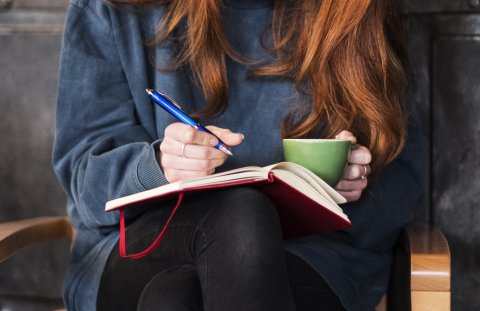
Mint Images/Getty
The good news is that there are easy ways to boost your own gratitude level even if that’s not something that comes naturally. For example, grab a notebook and try jotting down three to five things you’re grateful for every day. It sounds simple, but research shows that this practice can boost your overall happiness in as little as two weeks. Or write a thank-you letter to a loved one, friend or co-worker. Not only do gratitude letters help you to organize all those grateful feelings into words, but they also strengthen your bonds to the people in your life who matter most to your happiness.
Be in the Moment
The new year is naturally a time of looking backwarDs anD forwards. But that’s not the only time our minds tend to move away from the present moment. One study by a team of Harvard psychologists found that we spent more than 40 percent of the time mind-wandering—not paying attention to the here and now. Which is bad news for our happiness levels, because a growing body of research shows that focusing on the here and now makes us feel better.
So this new year, try getting your mind back on the present moment. If that feels tough, consider developing a meditation practice, something that has worked wonders for me. Studies show that even five or ten minutes of meditation every day can boost not only your daily concentration but also your mood levels.
A regular meditation practice can also help you realize that your thoughts are just…well, thoughts. The practice of sitting with unhelpful emotions like fear, anger or jealousy—even for a few minutes—can help us start to put them in some perspective, and to notice that they often depart just as suddenly as they arrive in our minds, which can help us avoid letting our negative emotions dictate our actions.
And if signing on for a regular meditation practice feels like too much during the pandemic, you can take baby steps towards being present by engaging in a bit more savoring. Commit to noticing the taste of your morning coffee or how nice a warm shower feels. The simple act of intentionally noticing afresh what the world around you looks, sounds, and feels like can help you remember that there are good, pleasurable things all around, if you take a little time to pay attention.
Rest and Move
When my students ask me what’s the first step they should take to be happier, my answer is always the same: Get some sleep. We know that sleep is important for our physical health, but research shows that it’s also extremely important for our mental health. Having a solid eight hours of shut-eye is the foundation on which all the other happiness habits rest. The problem is that getting the right amount isn’t easy. For me, there’s always that one last email to send before bed. Or one more quick peak to take on my Twitter feed. Or that new Netflix show to check out.
So this year, try to embrace healthier sleep hygiene. Ban devices from your bedroom. Instead, read a book or magazine—one made of paper—before bed. And make sure your bedroom is as dedicated to sleep as possible. If you allow your sleeping space to become an office, lounge or home cinema, you end up confusing your body. A pre-sleep ritual (such as a glass of warm herbal tea or a nice bath) can also help reinforce the idea that your waking day is ending and your all-important sleep time is beginning.
But sleep isn’t the only healthy habit that promotes better mental health in addition to better physical health. Another great healthy happiness boosting habit is exercise. One study found that doing a half-hour of cardio on a stationary bike reduces the likelihood that we’ll feel things like tension, anger, depression, and even fatigue. And the effect was shown to last for over 12 hours.
Be Kind
At times of crisis, we’re often tempted to turn inward: It seems like feeling better requires putting our own needs first. Treat yourself, as the current mantra says. But the science suggests that these self-centered inclinations are wrong. In fact, the best way to promote your own self-care is to provide other-care.
Research shows that we get happiness from doing nice things for other people. The people who self-report being happiest are focused on those in need—they donate more of their time and money to charity and engage in random acts of kindness. So why not bolster your mental health in an evidence-based way by doing something good for anoth- er person? If you’re working remotely, donate the money you saved on gas this month to a good cause. Or just check in with a friend who’s struggling. Doing kind things for others is a surprisingly effective way of boosting our own well-being.
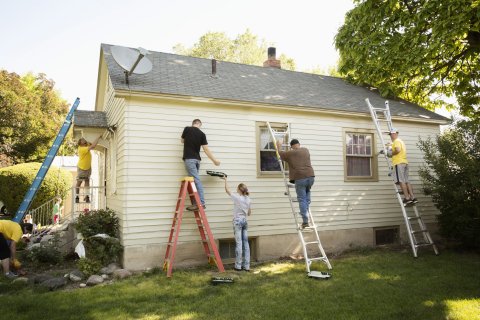
Hill Street Studios/Getty
But do be kind to yourself as well. The season of New Year’s resolutions can be a time when it’s easy to beat yourself up. We shame ourselves like an inner drill sergeant by ruminating on how badly we’ve done in the past year and how we need to turn things around for the new year. Or else.
But research shows that our inner brutal drill sergeant isn’t as motivating as we assume. Harsh self-criticism and unrealistic expectations will destroy your morale and make you give up before you even begin. A better strategy for the new year is to extend yourself some kindness, or what psychologists call self-compassion. Self-compassion means remembering that you’re human and that—just like everyone else on the planet—you’re doing the best you can in some pretty tough times. Giving yourself a bit of kindness doesn’t just feel good. It’s also a surprisingly effective way to meet your new year goals. Research by Kristin Neff and her colleagues, for example, shows that talking to yourself in the manner of a caring and helpful friend helps us reduce procrastination, eat healthier and exercise more. So try doing unto yourself as you would do unto others and give yourself the benefit of the doubt a little more in 2021.
The tips I’ve outlined here won’t make the challenges of the COVID-19 pandemic disappear the moment the calendar switch- es over to 2021, but research shows these quick practices can boost your mood and give you a bit more resilience—more happiness, even—in the New Year.
Dr. Laurie Santos is a professor of psychology at Yale University and host of The Happiness Lab podcast. To learn more, you can check out her online course called The Science of Well-Being, available for free here.
